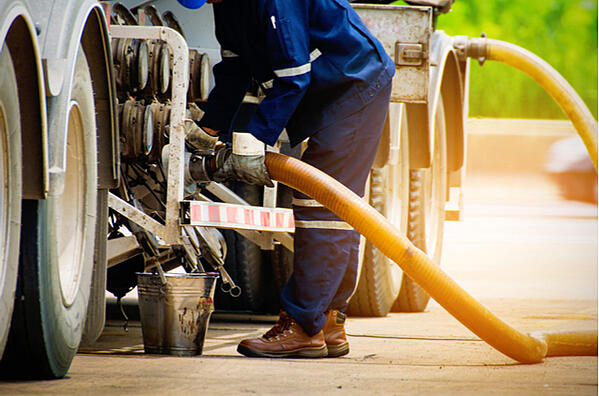What Is Fuel Polishing?
Posted by Kristopher Schwind

If you’ve ever experienced a power outage for an extended period of time, you know just how important a standby generator is—especially if you manage a mission-critical facility, such as a hospital.
What you may not know, though, is how important your fuel quality is. Simply put, high-quality generators need high-quality fuel for optimal performance. And high-quality fuel comes from sound fuel maintenance.
Virtually all commercial generators—especially those supplying backup power to mission-critical facilities, data centers, or municipalities—run on diesel fuel, which inevitably breaks down.
Even in the best-case scenario, diesel fuel will start degrading in roughly six months. However, depending on the type of fuel you use and how you store it, it can actually break down even sooner. For example, if your generator fuel sits in a warm environment where moisture is present, microbial contaminants (e.g., bacteria, mold, yeast) will grow and contaminate it.
Additionally, most generator fuel tanks sit for months on end without being used, which can lead to fuel problems—the most common cause of generator failure.
So, what can you do to save your fuel supply and keep your building powered up in the midst of an outage? Make the health of your fuel system a top priority by having it regularly cleaned.
The next question for many is whether to have their fuel polished, scrubbed, or filtered.
Generator Fuel Cleaning 101: Polishing, Scrubbing, and Filtering
Fuel polishing and fuel scrubbing are one and the same, but for our purposes, we’ll be using the term fuel polishing.
Fuel polishing is a process involving the careful removal of non-combustible (bad) contaminants that have accumulated over time—such as water, sludge, and other non-fuel solids—while keeping the combustible (good) ones that are vital components of diesel fuel and needed to meet ASTM standards.
This enables you to continue using your existing fuel supply instead of having to replace it. Because most commercial generators hold thousands of gallons of fuel, fuel polishing can save you thousands in fuel costs alone.
Fuel filtering, on the other hand, removes everything from the fuel, including the good contaminants you need to ensure your fuel is compliant with industry and regulatory standards.
While fuel filtering can serve as a quick fix or short-term solution for removing bad contaminants, it will ultimately end up costing more in the long run. You’ll spend a lot of time and money draining and replenishing your fuel supply, as well as frequently replacing fuel filters.
Aside from higher maintenance costs, it’s important to also consider the cost of any fines you may incur if you fail a fuel inspection.
In short, fuel polishing is a cost-effective way of ensuring your fuel is primed to perform and stays up to industry specifications, whereas fuel filtering is not.
With the benefits of fuel polishing in mind, let’s now take a look at its role in meeting legal and regulatory specifications for emergency power plans.
Fuel Polishing for Compliance
If you’re a business owner, you’re aware of the various local and federal guidelines you must meet in order to remain operating. The National Fire Protection Association (NFPA)’s codes are one of many.
NFPA 110, in particular, establishes the Standard for Emergency and Standby Power Systems—including fuel system requirements, which are:
- 7.9.1.2 Fuel system design shall provide for a supply of clean fuel to the prime mover.
- 7.9.1.3 Tanks shall be sized so that the fuel is consumed within the storage life, or provisions shall be made to remediate fuel that is stale or contaminated or to replace stale or contaminated fuel with clean fuel.
- 8.3.7 A fuel quality test shall be performed at least annually using appropriate ASTM standards.
And if you’re in the healthcare industry, there are additional standards to meet.
Fuel Polishing and Healthcare Facility Requirements
In fall 2016, the Center for Medicare and Medicaid Services posted the final rule Emergency Preparedness Requirements for Medicare and Medicaid Participating Providers and Suppliers, which are now more stringent than ever.
So, if your facility provides care to Medicare or Medicaid recipients, the generator fuel testing and maintenance requirements [42 CFR § 482.15(e)] you must meet are as follows:
(2) Emergency generator inspection and testing. The hospital must implement the emergency power system inspection, testing, and maintenance requirements found in the Health Care Facilities Code, NFPA 110, and Life Safety Code.
(3) Emergency generator fuel. Hospitals that maintain an onsite fuel source to power emergency generators must have a plan for how it will keep emergency power systems operational during the emergency, unless it evacuates.
Other healthcare-accrediting organizations, such as The Joint Commission, also have their own additional requirements that must be met as well.
As you can see, the quality of your fuel is highly important for a number of reasons. Your fuel quality can mean the difference between having and not having power in the midst of an outage—and whether or not you’re meeting regulations and maintaining compliance with key laws and regulations.
You can help ensure your emergency power system is primed to perform, in the event of either an outage or a formal inspection, by having your fuel professionally polished.
At National Standby Repair, we offer on-site fuel testing and polishing services to ensure your business stays up and running—and your system stays compliant with state, federal, and industry regulations—at all times.
Kristopher Schwind is the proud owner of National Standby Repair.
 24/7 EMERGENCY GENERATOR SERVICE
24/7 EMERGENCY GENERATOR SERVICE REQUEST A QUOTE
REQUEST A QUOTE
 (914) 734-1400
(914) 734-1400